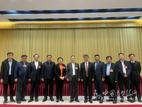On Tuesday, the National Religious Affairs Administration (NARA) issued the "Code of Conduct for the Online Behavior of Religious Clergy" (hereinafter referred to as the "Code"). Yesterday, an official from NARA answered questions from reporters regarding its formulation and implementation. Below is the full text of the Q&A released by NARA:
Q: Please introduce the necessity of formulating the Code.
A: The Code was introduced to maintain harmony and stability in the religious sphere online and to safeguard the legitimate rights of religious clergy. Since the "Measures for the Administration of Internet Religious Information Services" was implemented in 2021, significant progress has been made in regulating the online activities of religious personnel. However, problems remain: some religious personnel have engaged in self-promotion, sowed discord, and created division online; others have exploited their religious identity for attention and traffic; some have illegally preached doctrines and sermons as well as conducted fundraising. Such actions damage social morality, tarnish the image of the religious community, and have drawn calls from religious figures, believers, and society for stricter oversight.
Formulating the Code is an important step in implementing the "Regulations on Religious Affairs," the "Measures for the Administration of Religious Clergy," and the "Measures for the Administration of Internet Information Services." The 2017 revised "Regulations on Religious Affairs" stipulated that Internet religious information services must comply with laws and regulations. Subsequent regulations also placed requirements on the clerical personnel's online conduct. Therefore, a more detailed system was needed to clarify standards and guide religious clergy to act online within the bounds of law.
Q: Please share how the Code was drafted.
A: NRAA thoroughly studied relevant laws and held multiple special meetings, soliciting broad input from religious communities as well as departments in charge of united front and religious affairs. After the draft was prepared, it was reviewed by central and state agencies, national-level religious organizations, and local departments. Based on their feedback, revisions were made before the Code was finalized as a regulatory document.
Q: What are the guiding principles for religious clergy's online conduct?
A: When conducting online activities, religious clergy shall love the motherland, support the leadership of the Communist Party of China, uphold the socialist system, comply with laws and regulations on religious affairs, and practice the core socialist values. They should adhere to the principles of independence and self-governance of China's religions, promote the sinicization of religion, and safeguard religious harmony, social stability, and ethnic unity.
Q: What requirements does the Code set for fostering good online habits?
A: Religious personnel should consciously resist harmful online culture. They are prohibited from self-promotion, exploiting religious topics for attention or traffic, spreading unverified information, stirring conflict, spreading rumors, defaming or framing others, or insulting or discriminating against believers and non-believers alike. Such behavior undermines harmony within and between religions.
Q: What types of online activities are permitted?
A: When religious clergy act online, not in their religious capacity, they must still abide by laws and regulations. If they register or use public online accounts in their religious capacity, they must submit their religious clergy credentials to Internet service providers for verification. When preaching or engaging in religious education online, religious clergy may only do so through official websites, apps, forums, or similar platforms legally established by licensed religious organizations, institutions, or places of worship that hold a "License for Internet Religious Information Service."
Q: What types of online activities are prohibited?
A: Religious clergy are forbidden from engaging in self-promotion, colluding with foreign forces, supporting or participating in overseas religious infiltration, displaying or selling extremist religious attire, spreading extremist ideology, inciting fanaticism, promoting cults or heterodox teachings, or engaging in superstition. They may not proselytize via live streaming, short videos, online meetings, WeChat groups, or Moments; use religion for profit; distribute internal or illegal religious publications; or employ artificial intelligence for proselytization. They are also barred from producing, publishing, or spreading illegal information or conducting unlawful activities online.












